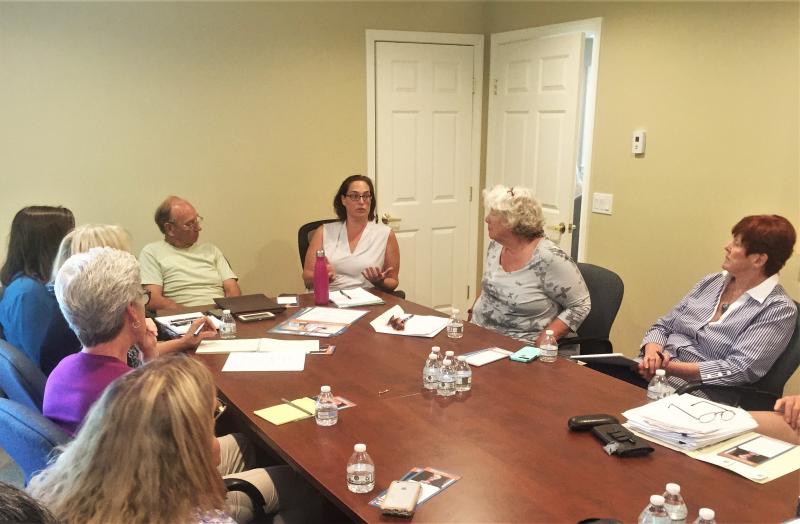Regional housing group meets with Bath Housing director
The housing committee met at the Boothbay Harbor Region Chamber of Commerce office July 11 to hear from Bath Housing Executive Director Deb Keller.
Keller spent four years at the Genesis Community Loan Fund and nine years at Avesta Housing doing loan compositing and tax credit development. At Avesta, she saw the creation of the home ownership center and worked with assisted living and the housing choice voucher program.
In 2014, Keller fell into her role at Bath Housing which she described as a housing authority with a 501 (c) (3) nonprofit development corporation arm. When she took the job, she told Bath Housing she did not plan to run it as a classic housing authority since they basically run themselves.
“... How can we shake things up how can we look at the needs of the community and how can we reposition this organization to best meet those needs? That's what we've done.”
In its customer service approach, Bath Housing has three methods of expanding housing, Keller said: a rental navigation program, real estate development, and Comfortably Home, a home modification program that allows seniors or disabled to age and live in place.
The housing navigation program explains the process to applicants, including the waiting time for vacant rentals.
Keller said one of the difficult changes since the start of her career was that federal and state programs for housing have been cut down to essentially one – the Low Income Housing Tax Credit program through the Internal Revenue Service. Keller said it is a good program and is creating housing in Maine, but does not meet all of the needs as it typically only serves the lower middle class.
“What people are trying to do all around the state is fit their housing needs in the tax credit program when (it) often isn't the right program for that community. And I will say, you will probably not ever see a tax credit program on this peninsula.”
Resources to aid housing are dwindling and becoming more specific and more competitive, said Keller who offered a number of strategies to help encourage a rental market – assessing housing stock, reviewing ordinances like minimum lot size or adding ordinances like accessory dwelling units, and providing density bonuses. She has heard of municipalities finding property tax strategies such as empty house taxes and tax work-off provisions to let citizens, typically the elderly who wish to age in place, work off their property tax by volunteering for town departments.
“There is no shortage of ideas and tools out there, it's just having some people who are willing to be creative and research and find ways.”
Keller suggested the Boothbay region shy away from two ideas waning in popularity: housing authorities and new construction.
“Not to say that you can't do development, but I think there are a lot of challenges to it in really figuring out … where the development capacity belongs … Don't confuse ‘housing authority’ with ‘housing organization.’ You could create a new organization or that new organization could be standalone or that new organization could be affiliated with another organization and they could have a shared board of directors. Or you could take an existing organization and expand through the articles of incorporation their mission. There's multiple ways to do it.”
Keller said she would not suggest anyone commit to housing lightly. Boothbay Region Community Resource Council Executive Director Katie Spencer White said she could see BRCRC becoming involved with housing to a small degree. However, Keller warned she has seen her share of nonprofits quickly destabilize or be spread thin by attempting to get into real estate and affordable housing.
The region may want to start as a housing organization or trust rather than an authority, since authorities only run low income public housing and never deal in the construction or renovation of new properties. Housing authorities are going away because their their quasi-municipal standings limit them, Keller explained. A housing organization or trust would be best formed as a 501 (c) (3) nonprofit organization.
Maine has 12 to 15 tax credit developers including some housing authorities, private nonprofits, or for-profit developers, Keller said. She said she would be happy to share some names. The biggest hurdle is making sure the region checks off enough boxes from Maine's Qualified Allocation Program (QAP). Beyond the QAP prerequisites, being able to offer a developer a tax increment financing (TIF), donated land, and other incentives is part of it.
One thing is certain, said Keller: one of the most important things about the region's housing issues is the fact a group of people are trying to solve them.
Event Date
Address
United States























